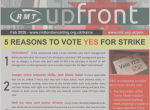Similar topics:
Attached documents
Click '1 attachment' / file name to download RMT's pay claim submitted to London Underground. The first section, the text of which is below, is also being submitted by TSSA and Unite. We hope that this united approach from three of LU's unions will improve our prospects of securing an acceptable offer.
1. A substantial pay award in a one-year deal
The dramatic rises in food, fuel, and other living costs, especially in London and the South East, necessitate a substantial pay award in excess of RPI, with no strings attached, in order for our members to continue to meet the cost of living. The increased workload on London Underground staff, compounded by increased passenger numbers and reductions in staffing levels, must also be recognised by the company and compensated for in the pay award. Those members who receive the lowest salaries bear the brunt of any increase in living costs and, as such, should be afforded additional protection in the form of a minimum flat rate increase. There should be an increase in remuneration for working on public holidays.
2. Improved conditions
We wish to achieve improvements in our members’ working conditions, including:
(a) a reduction the working week to 34 hours, and a reduction in the number of working days to four per week.
(b) more progressive ‘family-friendly’ policies, to include paid leave for domestic emergencies, and improvements to maternity/paternity/adoption pay and leave to an equal level for staff in all grades, at least as good as that currently enjoyed by CMO staff.
(c) access to final salary pension provision for all employees on an equal basis, with no increase in employee contributions or reduction in benefits.
(d) equal free and privilege travel facilities for all staff to match the best currently enjoyed in LUL, and continuation of free and privilege travel facilities when retired at the same level as enjoyed as when an employee, this is for all staff regardless of starting date of employment.
(e) London Underground work to be carried out by directly-employed LU staff rather than via agencies, with current agency staff given a priority offer of the new jobs created by this measure.
- 6301 reads






